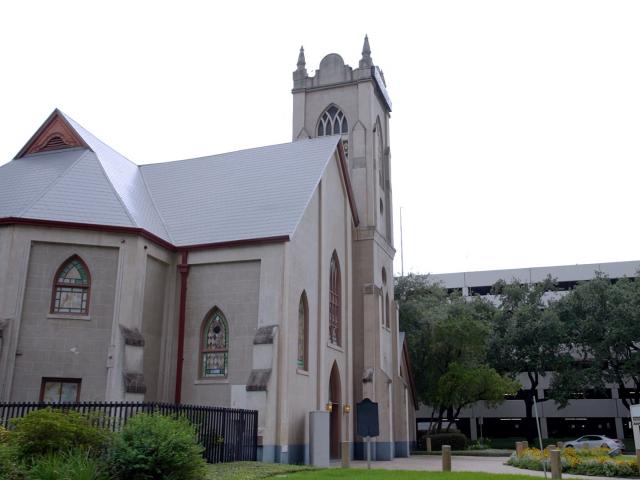HOUSTON, Texas — Antioch Missionary Baptist Church recently celebrated Juneteenth amid a rich history that includes its founding in 1866, just months after federal officials in nearby Galveston announced emancipation for enslaved people. Pastor Lou McElroy says it’s clear that the Lord paved the way for the church’s beginning as well as for its first full-time pastor, Jack Yates.
McElroy also shares a personal connection with Yates. His wife, Jackie, is Yates’s great, great-granddaughter.
Yates was born enslaved in 1828 on a plantation near Gloucester, Virginia. Pastor McElroy says God prepared Yates for leadership early on.
“The story goes that the slave master’s wife passed away, and his mother was called into the home to take care of the home and children and cook and clean,” says McElroy. “That in itself, I believe, was a blessing of God because it afforded Jack a whole new world.”
In his new environment, the young Yates learned to read, write, and carry out business.
“We know that he was able to grow to the position where the slave master trusted him with business transactions and receipts, and calculations,” said McElroy. Yates eventually became a minister on the plantation and married an enslaved woman with whom he had 11 children. Then, God unveiled his Texas plans for the family.
***Please sign up for CBN Newsletters and download the CBN News app to ensure you receive the latest news from a Christian perspective.***
“We know that His will was for Jack Yates to get here,” said McElroy. “The question is how He got him here is the phenomenon.”
Yates’ enslaver freed him, says McElroy, and shortly after, his wife’s enslaver announced they were moving to Texas.
“Jack Yates did something extraordinary. He didn’t stay north and work to save money to buy his family’s freedom,” said McElroy. “Later, he immediately went back into slavery because of the love of his wife and children.”
Fast forward to June 19, 1865, when news of the 1863 Emancipation Proclamation made it to Galveston.
“You’ve got hundreds of former enslaved Africans who are now freed. There’s no black neighborhoods, there are no black hotels, there are no black Airbnbs,” said McElroy, noting that the Union soldiers gave them tents. “But here’s the piece for me that is overwhelming – the first thing that they did after settling in was not build a neighborhood, not build a school, not build a shopping center, but they built a church in which they gave God glory.”
Antioch became the first Black Baptist church in Houston as well as the first brick structure in the city to be built and owned by African Americans.
“They didn’t get revenge. They didn’t turn on themselves. They celebrated and purchased this existing property,” said McElroy. “Jack Yates was a huge proponent of business, buying real estate, paying cash, and so started building the first church completed in 1875.”
Yates not only championed Christ, but he also made education and home ownership a priority, positioning the church to help its members transition from slavery to freedom.
Today, the building sits in the heart of downtown Houston, nationally recognized for its Gothic Revival architecture. Its steep cross gables, pointed arch windows, and “Jesus Saves” sign direct Houston to Christ.

McElroy’s wife, Jackie, grew up in Antioch, sitting with her family in the center back of the sanctuary and hearing the stories of her great, great-grandfather. When she and Lou married, he was serving at another church, and the conversation turned to Antioch.
“I was torn being committed to where God had me and the love I had for my wife,” he said, acknowledging that in the end, his love for his wife led him to Antioch, just as love had led Yates to Texas.
“Sometimes you have to pinch yourself,” said Jackie. “Never in a million years running around these pews would I have imagined that the man I married would be the pastor of the church. It’s an honor and it’s a blessing. It’s a sense of duty. It’s not to be taken lightly.”
Today, the legacy of Jack Yates can be seen and felt across Houston. He helped to found Emancipation Park, the city’s first outdoor public space for African Americans. Jack Yates High School is named in his honor. And of course, Antioch Baptist continued to spread the Gospel and serve as a community center for learning.
“To still be able to be here today. That says something,” says McElroy. “That says that we have discovered, God has poured into us something that we should and could share with the rest of the world to teach them that despite your adversity, despite your struggle, love, there’s a love poured in there. God is in it.”


















